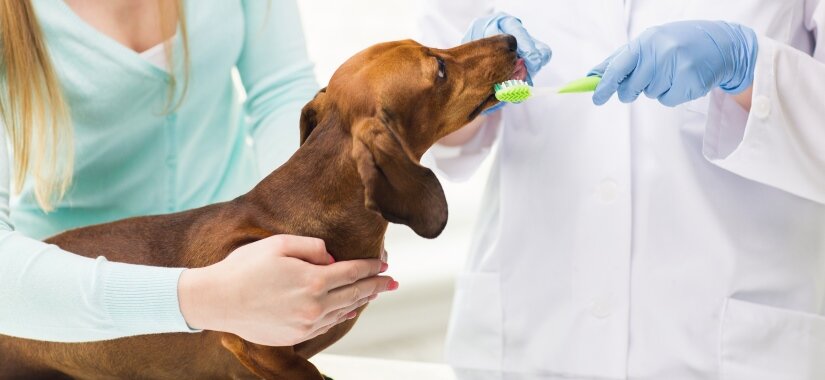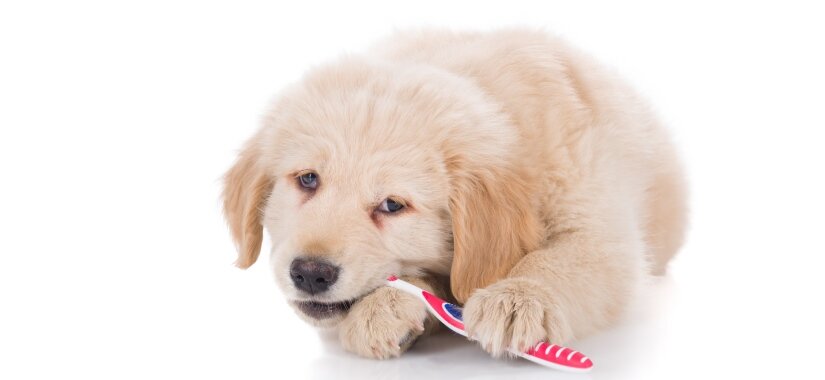Puppy oral care is often taken for granted, yet starting early by brushing your puppy’s teeth every day will help keep cavities and bad breath away. Many pet parents are not aware that bad breath is one of the first signs of dental issues like periodontal disease, and while this doesn’t affect puppies, it can progress later on.
Periodontal disease is when dental disease filters into the bloodstream and travels throughout the body. This can lead to serious health issues in dogs later on in life. According to The American Veterinary Medical Association (AVMA), 80% of dogs will develop periodontal disease by the time they are three years old.
In this blog, we’re going to discuss the seven causes of foul puppy breath, and how dental health awareness during puppyhood can help prevent periodontal disease later on in life.
Puppyhood & Dental Care
Puppy breath lasts around 12 weeks, but if your puppy’s breath is more like bad breath, here’s what you should know. If you’ve recently adopted or purchased a puppy, you should take him to the vet for his first shots and checkup. You should also ask your vet about dental care and how you should look after your puppy’s teeth.
Your veterinarian will show you how to brush your puppy’s teeth and what canine dental products to purchase. If you don’t brush your dog’s teeth, that delightful puppy breath may just become the bad breath. In this blog, we’ll discuss the seven causes of your puppy’s bad breath.
Why Puppy Breath Smells Sweet?
The AVMA adds that “Far from being simply a cosmetic issue or a cause of bad breath, oral disease in pets can cause receding gums, tooth loss and significant pain. Even worse, bacteria in the mouth can enter your pet’s bloodstream, leading to life-threatening conditions affecting the heart, liver and kidneys.”
The AVMA recommends that owners get annual dental exams and cleanings at their veterinarian and use a dental toothbrush for dogs and cats. Beginning a pet dental care routine at home with your pet combined with regular veterinary dental care and exams is key to preventing dental disease.
Here’s the take on why your awesome puppy has such delightful puppy breath:
- Your puppy’s breath smells like the lactose in his mother’s milk which has a sweet fragrance.
- Digestive enzymes in your puppy’s stomach break down the proteins in his mother’s milk, which adds to the fresh aroma.
7 Causes of Bad Breath in Your Puppy
The most important part of being a pet parent is taking good care of your puppy. That includes dental care and regular veterinary care. Numerous dental issues like the following can cause bad breath in pups:
- Impacted teeth: Infections can result from your puppy’s impacted teeth and cause a foul odor.
- Gum disease and swelling: Gingivitis or mouth infections may occur early in your puppy’s mouth even though his teeth are brand new.
- Worms: Parasites like roundworms, tapeworms, hookworms, and whipworms can be passed from your puppy’s mother at birth or through her milk and affect puppy breath odor. Worm infestation can cause death in your puppy and should be ruled out as a cause of your puppy’s bad breath right away.
- Eating poop: The medical term coprophagia describes the habit of eating poop. Your puppy’s mother most likely eats her puppy’s poop to keep the area clean, and puppies will sniff and eat poop as a natural way to discover the world around them.
- Buildup of odor-producing bacteria: Gastrointestinal tract infections may be the cause of halitosis in your puppy.
- Kidney disease: Your puppy’s breath will have an odor like urine.
- Liver disease: Puppy breath will be foul, and your puppy may vomit, have a loss of appetite, and have yellow-tinged corneas.
5 Ways to Prevent Your Puppy from Having Bad Breath

The AVMA adds that you should
“Get the right tools: Select a soft-bristle brush or finger brush made specifically for pets. Don’t use toothpaste made for people, as these products could make your pet sick.
While there are many pet products marketed with claims that they improve dental health, not all of them are effective. Talk with your veterinarian about any dental products or treats you’re considering for your pet, or ask your veterinarian for their recommendations.”
You should also gradually introduce your puppy or adult dog to their dental brush and paste to allow them to smell and taste them, examine them, and associate these items with treats to relate to them as a positive connection.
Take your pup to the vet if you see any of the following:
- Bad breath
- Broken or loose teeth
- Extra teeth or retained baby teeth
- Teeth that are discolored or covered in tartar
- Abnormal chewing, drooling or dropping food from the mouth
- Reduced appetite or refusal to eat
- Pain in or around the mouth
- Bleeding from the mouth
- Swelling in the areas surrounding the mouth
Puppy Dental Care Tips
- Take your puppy to your vet for regular checkups to ensure your puppy does not have underlying conditions that may cause bad breath.
- Care for your puppy’s teeth early by brushing his teeth with canine toothpaste.
- Feed your puppy balanced and nutritious high-quality food.
- Provide safe chew toys that will keep his breath fresh and not damage your puppy’s teeth.
- Keep your dog hydrated with plenty of fresh, clean water to maintain fresh puppy breath.
Dog Health News talked with the founder of Bad Breath Institute™, Dr. Vahé Ohanessian, D.D.S. and Petros Dertsakyan, V.P. of Corporate & Business Development, and this is what they have to say about bad breath in dogs:
“What is understood and done for human oral hygiene should be the same approach taken for dogs. Physical and manual removal of plaque is the #1 means of removing oral bacteria, promoting oral hygiene and health, and minimizing bad breath. This is the primary cause of bad breath, and all other factors combined are secondary. It is essential to brush your dog’s teeth!
What you do for yourself, do for your 4-legged family members! Be a good pet parent, and brush your dog’s teeth!” ~ Dr. Vahé Ohanessian, D.D.S and Petros Dertsakyan, V.P. of Corporate & Business Development at Bad Breath Institute™
Keep in mind that your pup may become irritable if he’s suffering from dental pain. He may also lose his appetite. You should visit your vet promptly if you notice any dental issues. As usual, always be gentle with your pup’s mouth when looking for dental problems.
All in all, to keep those pearly whites looking good, you’ll need to make sure that dental care becomes a priority. It can take years off a dog’s life and cause pain, infection, and inflammation if left untreated.
